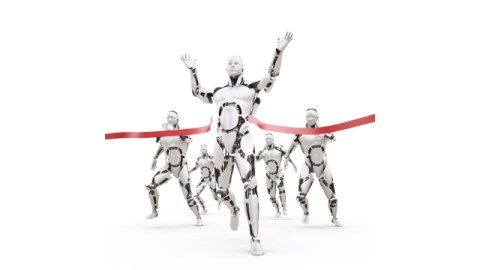The Robot Hiring Boom Has Arrived

The knock against many technology companies is they create too few jobs in their own countries. That complaint needs serious amending. Tech companies are creating plenty of jobs for robots. Foxconn, the leading manufacturer of electronics in the world — which makes Apples iPhones and iPads, among other products — plans to build 500,000 robots over the next three years to either replace or augment the company’s human workforce.
Foxconn currently supplements its 1.2 million human workers with 10,000 robots. It remains unclear exactly what the somewhat secretive Taiwanese-owned company’s plans are for mixing human and robot labor, but humans almost certainly stand to lose jobs. A company statement boasted that its plan will create “an empire of robots.”
In one regard, this investment will help the company’s labor relations. After all, robots don’t hurl themselves out of windows when overworked. Human employees at Foxconn, however, have not faired so well. Fourteen committed suicide in 2010. Labor rights groups have described Foxconn’s factories in very harsh terms, as 21st century gulags, “labor camps” with “military-style drills.” Since the suicides in its factories mostly involved workers jumping from the top floors of buildings in Foxconn’s Shenzhen-based plants, the company installed suicide-prevention nets.
The official response to the media sounded every bit as cynical. Foxconn’s CEO Terry Gou offered the following non-apology, stating the suicide rate at his company was “within the norm” for China.
Watch:
What’s the Big Idea?
Foxconn has annual revenues of over $60 billion, and the company has put up an astounding compound annual growth rate of over 50 percent for the last decade. In order to maintain that level of growth, and to meet extraordinary global demand for tech electronics, Foxconn is making an ambitious push to automate.
This could be a step in the right direction from both a business and humanitarian perspective. After all, freeing humans from conditions that resemble slave labor can’t be such a bad thing. According to a company statement, Foxconn will be able to move humans “up the value chain” to more skilled fields such as research. Robots, on the other hand, don’t need higher wages, improved workplace conditions or suicide safety nets, all of which cut into Foxconn’s bottom line.
What’s the Significance?
The use of industrial robot labor is spreading rapidly in China. Foxconn is an industry leader, and other manufacturers will have to follow suite. Access to the cheap labor is key to manufacturing, and a driving force behind the economic development of greater China. As companies like Foxconn lead the way in our transition to a robot economy, the question remains how painful this transition will be, and how can the pain best be mitigated?
Every industry, from agriculture, to the military, will be impacted by robot labor. And advances in robotics are happening rapidly. Consider the video below, for instance, which showcases a very life-like robot, who will be used to test protective vests for the military.
Watch here:
Image courtesy of Shutterstock
Follow Daniel Honan on Twitter @Daniel Honan





